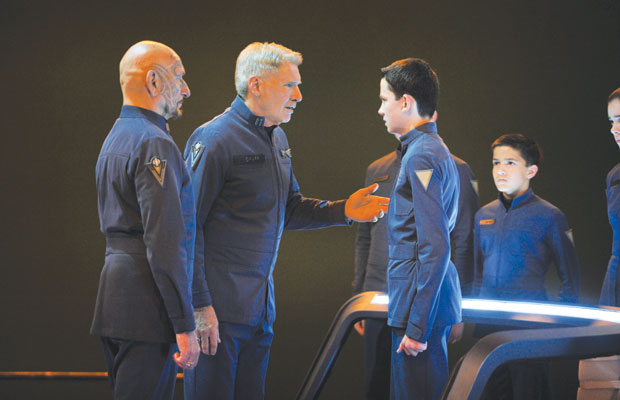Protesting a movie like ‘Ender’s Game’ just because of the author’s politics doesn’t make much sense

The best reason not to patronize a movie like ‘Ender’s Game’ is that, despite all the Oscar-power onscreen and behind it, the film simply doesn’t look very interesting. (Photo courtesy Summit Entertainment)
Today, the film Ender’s Game opens on 3,350 screens across North America. It’s a sci-fi extravaganza with two Oscar winners and more than half-a-dozen more nominations among its principal cast and director, Gavin Hood. You’d normally expect to see me write about it a few pages further in Dallas Voice than I am this week.
But I’m not reviewing it. I don’t even care that much about it. And I encourage everyone else to do the same. But subtlely.
The film is based on a novel — well-received when it was published in 1985 — by Orson Scott Card, whose anti-gay rhetoric, dating back to at least 1990, has been exhaustively documented. He’s even been on the board of directors for the National Organization for Marriage. Gay rights activists opposed Card often — just this year, they were in a furor about Card being hired to write a new Superman comic book. DC Comics responded by hiring someone else to do it.
But films are different. The time to protest a comic book was before it was written, and the time to protest a film is before photography starts.
But most activists waited until the film was being promoted at San Diego’s Comic-Con this summer to call for a boycott with full-throated frenzy. That’s when the website SkipEnders Game.com was launched, and the studios, Lionsgate and Summit Entertainment, kept Card away from the convention.
The problem is, all this did was get people talking about Ender’s Game three months before the ad campaign ramped up and well after it was slated for release. “Any publicity is good publicity” isn’t just a cliché; it may well be a tenet of marketing.
Boycotts tend to be polarizing anyway. When gays boycotted Chick-fil-A, right wingers (including Sarah Palin and Glenn Beck) went out of their way to patronize Chick-fil-A in counter-protest. To us, they looked like the 2013 equivalents of racists standing outside Little Rock schoolhouses in 1957. But they actually ginned up more business for the company.
Actively railing against Ender’s Game — especially before anyone has really seen it (I skipped the press screening) — makes people look closed-minded and rash. How can you hate something you haven’t even seen? That’s a textbook definition of prejudice — something gays have fought for ages. And frankly, the film just doesn’t look that good to me. Why not let it collapse on the weight of its own (ir)relevance?
There are recent precedents where letting the chips fall does wonders. WikiLeaks founder Julian Assange openly attacked actor Benedict Cumberbatch, who plays Assange in The Fifth Estate, to denounce that film. That ended up being an esoteric protest at best, one reported more on Sunday morning punditfests than on frantic local newscasts. But it was unnecessary. The Fifth Estate had the worst wide-release opening weekend of 2013, and was both a commercial and a critical flop. The movie simply didn’t touch a chord with audiences or reviewers; protests were superfluous.
And what are we protesting, anyway? Even SkipEndersGame.com says, “[we] can’t retroactively affect the pay of the film’s cast and crew,” and admits, “Ender’s Game is not an anti-gay story and does not reflect Card’s hateful beliefs.” Then what’s the point? Wagner was an anti-Semite; Martin Sheen and Jack Nicholson — vocal liberals both — have stated categorically their opposition to abortion; Walt Disney was a red-baiting union-basher. Should progressives also avoid The Lion King and Parsifal and The West Wing to show them how we feel?
Boycotts, especially those involving free-speech issues, always give me the willies anyway. I haven’t bought a drop of gas from Exxon in 25 years, based initially on their handling of the Valdez disaster, but that hasn’t stopped them from becoming the wealthiest corporation in the history of the universe. I do it for myself, not for anyone else. Personally, I went to see David Cronenberg’s Crash precisely because Ted Turner said it was garbage and should be banned. Thing is, Turner was right: Crash was terrible. I regret spending my money to see it … money I probably never would have spent if there wasn’t such a hubbub around it.
Boycotting Ender’s Game seems like it will make precious little difference in Card’s politics. Hectoring others to avoid it only draws attention. So how ’bout this: Don’t go see it. Or do, but maybe go mid-week, after the reviews have come out, and when its opening weekend tallies will be a thing of the past. But a film, unlike, say, the conduct of a politician, can’t be changed by yelling at it. Orson Scott Card simply isn’t worth your breath.
This article appeared in the Dallas Voice print edition November 1, 2013.

